Posted by Lakshmi Pillai
Beauty standards are used to grade individuals and permeates into one’s sense of self-worth. Advertisements casually vilifies ageing or ‘self-neglect’ to ring an alarm about external beauty. Women need to age ‘gracefully’, look less like an ‘aunty’, feel ‘soft’, have ‘thicker, longer, stronger’ hair, and if necessary need external interference, that is, cosmetics. This article does not antagonise external interference and only wishes to reread the perception of external interference held by society, the hypocrisy of beauty standards, and women’s agency with respect to it all. It is in this regard that I wish to review the Korean drama My ID is Gangnam Beauty (2018).
https://www.youtube.com/watch?v=FcDoEO0NmT4
Korean beauty and skin care is praised for being intensive and regenerative. Korean beauty standards show a bias to fairness, often touting dark skin as a result of bad lifestyle and poor grooming. The beauty standards also focus on culture-specific features. South Korea has the world’s largest booming cosmetic surgery industry. Cosmetic surgery is almost routine in a South Korean individual’s life, but a tremendous amount of respect is given to those who look ‘naturally beautiful’. The Gangnam Belt or the Beauty Belt is famous for its numerous privately-owned clinics for reconstructive procedures and for being a hotbed for medical tourism.
My ID is Gangnam Beauty, is a drama that looks at the life of a young timid woman, Kang Mi-Rae, who was bullied in school for being ‘ugly’. Before she begins life anew in the university, she undergoes plastic surgery, in the hope of looking like a ‘regular student’. The surgery is a little too successful – there is no resemblance to her previous self and she looks almost model-esque. Mi-Rae finds it a little unnerving.
At the start of the first episode, she is seen grading everyone’s looks out of 100, revealing she has been conditioned to accept the societal standards of beauty. She meets Hyun Soo-Ah, a girl she grades a natural 100. Soo-Ah is unrealistically sweet-tongued and compliant, winning people’s favour. Soo-Ah and Mi-Rae immediately become the department’s popular girls and the male lead, Do Kyung-Seok, becomes the most popular male. The boys, apart from Kyung-Seok, are extremely shallow, and are often found grading girls on the basis of looks and misunderstanding friendly banter.
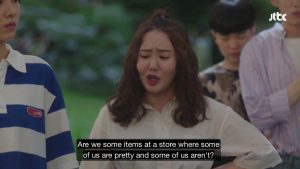
Image source: My Mile Shine Smile
Kyung-Seok takes an interest in Mi-Rae and is indifferent to ideas of beauty, telling her that while she has been victimised, she sees the world through the same lens that others use to see her. Mi-Rae soon realises that she has been conditioned to think in a certain way. Additionally, she is mocked as ‘Gangnam Beauty’, a derogatory term for those who have done too many surgical alterations to their face.
she is mocked as ‘Gangnam Beauty’, a derogatory term for those who have done too many surgical alterations to their face.
The drama constantly addresses objectification, especially in the episodes focusing on a festival. The prettiest girls on campus have to serve tables in uncomfortable and sparse clothing, selected by the boys. Three girls on the student body find the boys’ judgemental remarks exasperating and disturbing. These three girls aren’t allowed to help the serving girls because they aren’t appealing enough. The boys even explain to them why they can’t serve – one of them doesn’t smile enough, the other is too boyish, and the third is cute but too chubby.
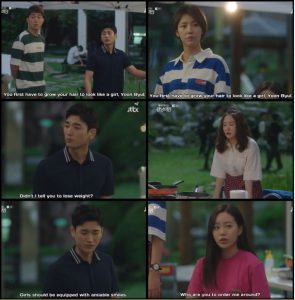
Image source: My Asian TV
The girls exact revenge the day after the festival by forcing the offending boys to wear a shirt with abs on it and plan to make them walk on campus but the plan is disrupted by a teaching assistant who tells the girls that revenge is no way to reform.
Also read: How K-Pop Perpetuates Double Standards For Men And Women
Kyung-Seok becomes Mi-Rae’s choice as he looks at her as she is. When asked by his friend if Mi-Rae is pretty or average, he says that she is just who she is. This perception towards people becomes the focal point of the k-drama.
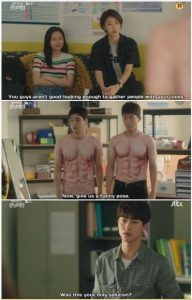
Image source: My Asian TV
Through Hyun Soo-Ah, the series addresses the problems of abandonment and self-harm. Soo-Ah doesn’t protect her body and is often compliant to men. She narrowly escapes an apparent acid attack by a classmate who misunderstood her attention towards him. She then decides to seek help to overcome her eating disorder and focuses on taking care of herself.
A sub-plot featuring the ‘chubby’ girl Kim Tae-Hee also addresses the issue of weight. She is often told that she is cute but that her weight is her weakness. Some of the boys snatch her food away, saying that they are doing it for her own good. She starts to date a boy that seems ‘woke’. However, he pursues Soo-Ah when Soo-Ah attempts to mislead him. Later when he attempts to reconcile with Tae-Hee, she says she doesn’t miss him and that he wasn’t worth it, which highlights her journey of self-love.
The girls evolve to develop a strong sense of self. The offending boys are constantly taught lessons on behaviour. No attempt is made to sympathise with the ignorance of the supporting male characters. The series is a lighthearted high school drama but tackles sensitive issues of body shaming, eating disorders, domestic violence, and even suicide.
When Kang Mi-Rae attempts to commit suicide in middle school, she is saved by Do Kyung-Seok’s mother, Na Hye-Sung, who gives her the most profound advice, “You are most precious to yourself.”
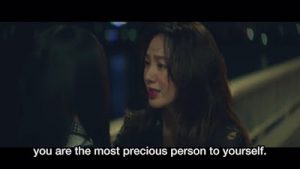
Image source: My Mile Shine Smile
The cosmetic industry continues to boom as it leaves its customers with a sense of insecurity concealed by a false sense of beauty. Cosmetic surgery for beauty enhancement thrives as customers fight natural ‘flaws’ and attempt to ‘fit in’ or ‘improve’. Does this industry figure as an antagonist to an individual’s sense of self? Or could it be strategically used to reinvent the self?
She is often told that she is cute but that her weight is her weakness. Some of the boys snatch her food away, saying that they are doing it for her own good.
This K-drama does not dismiss the beauty industry. The characters are often seen comfortably applying masks and make-up and dieting (healthily) to maintain weight. The focus is on choice and self-love. What’s natural and what’s plastic is constructed as a superficial factor. The focus is on the non-judgemental acceptance of others’ choices. If self-love is to be achieved through medical interference, it is considered perfectly alright.
Also read: Why We Need To Rethink Our ‘Criticism’ Of BTS And K-Pop
It is important however that self-harm does not become the route and thus Soo-Ah needs to undergo medical interference (psychiatric) to recover her self-esteem, just like Mi-Rae who sought medical interference (cosmetic) to recover hers.
Lakshmi Pillai is just an eternally mutable person and an unapologetic feminist who pens poetry and creative pieces, and low-key indulges in soul-searching in her spare time.
Featured Image Source: Soompi
About the author(s)
Guest Writers are writers who occasionally write on FII.
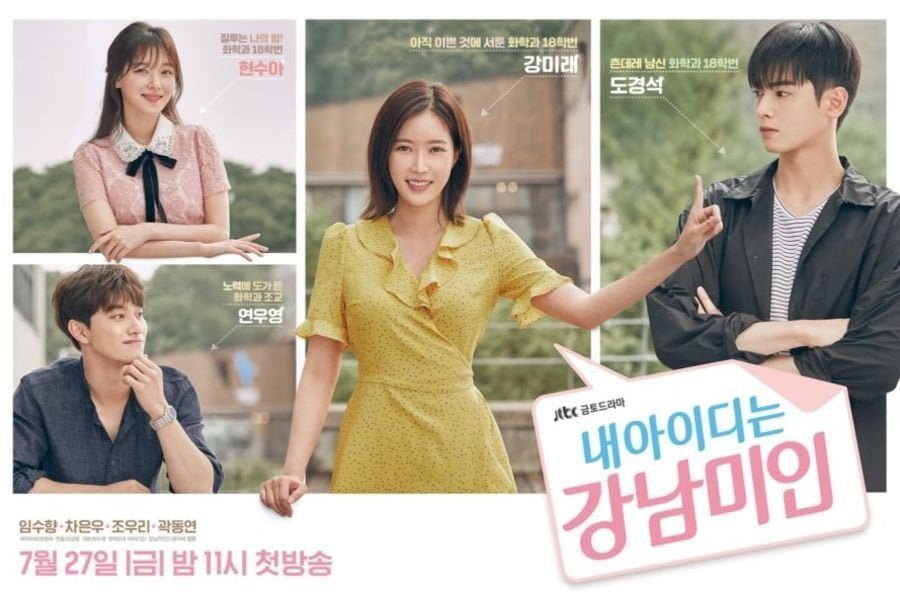




Great review!
Second it!
You found the right words about this drama.
Agree with you????
This is the first drama of this kind I saw.